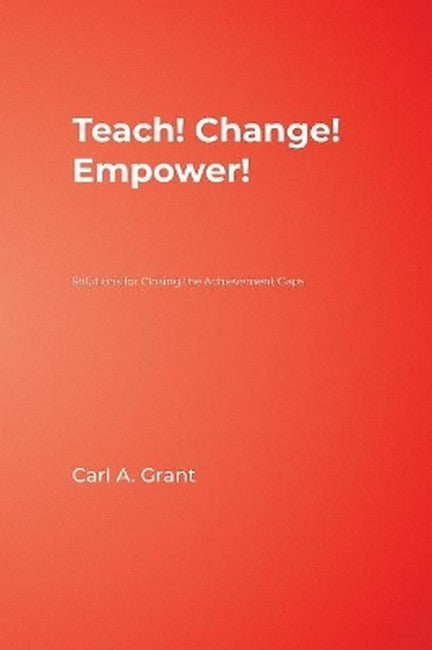Carl A. Grant is Hoefs-Bascom Professor of teacher education in the Department of Curriculum and Instruction at the University of Wisconsin-Madison. His work for more than thirty years has been with teachers and administrators who commit to improve students' achievement, enrich their knowledge and skill set in multicultural social justice, culturally responsive curriculum development, and teaching. He has written several books and many articles for teachers that address student achievement, curriculum development, teaching strategies, and parent-teacher engagement.
Request Academic Copy
Please copy the ISBN for submitting review copy form
Description
Preface Acknowledgments About the Author Getting the Most out of the Book Part 1. The Harder Work of Teaching 1. The Achievement Gap What is the Achievement Gap and Why Must It Be Eliminated? The Multiplicity and Intersectionality of Gaps Effects of the Academic Achievement Gap Action Plan 1: Revisiting the Struggle for Closing the Achievement Gap with Fresh Eyes 2. Diversity and Power Diversity Affirming Diversity All Teachers Need to Learn about Diversity Power in the Context of Change Where is Power in Your School? Action Plan 2: Affirming Diversity in Your Classroom & Power Structures in Society 3. Caring With Socio-Political Consciousness Becoming Socially Critical Fostering a Caring Community Among Students Action Plan 3: Caring with Socio-Political Consciousness 4. Acknowledging the Change/Transition: Step One Mobility and Change: A New and Different Time Multiple Teacher Roles & Change Changing the Markers of Achievement Action Plan 4: Goals for Change 5. Reacting to Change/Transition: Step Two Strong Feeling and Mixed Emotions Searching to Connect With Student Knowledge and Experiences Nervous Reactions to Racism and Other "Ism"s Reactions are Influenced by Context and Settings New Teachers Need Help Action Plan 5: Reacting to the Change - Confronting Our Biases and Conditioning 6. Investigating the Change/Transition: Self Investigation - Step Three Teacher Multicultural Attitude Survey (TMAS) Knowledge of Self: Self-Understanding and Self-Acceptance Multicultural Personality for Affirming Diversity Teacher Personal Dispositions Toward Diversity Knowledge About the School Community Attitudes and Dispositions of Teachers Who Work to Close the Achievement Gaps Reflection 6.4 Action Plan 6: Self-Investigation 7. Investigating the Change/Transition: Program Investigation The Achievement Reform Movement Action Plan 7: Program Investigation 8. Implementing Change: Step Four Knowledge Base for Closing the Achievement Gaps Knowledge of Curricular Content: A Strong Subject Matter Base Knowledge About Teaching: Pedagogical Content Knowledge Pedagogical Skills for Closing the Achievement Gaps Teacher Pedagogical Skills Survey Reflective Skills Action Plan 8: Teacher Knowledge About Content and Pedagogy Part 3. Change/Solutions in Practice 9. Cultural Competence Culturally Relevant Curriculum Reflection 9.3 Action Plan 9: Cultural Competence and Culturally Relevant Teaching 10. Change/Solution in Practice: Four Examples Conclusion References Index
"Teach! Change! Empower! takes the concepts of diversity and change-which are often complex, abstract, confusing, and not salient to many teachers who struggle with the meaning of the concepts in actual classroom practices-and uses them as a framework for something that is very real to teachers: the achievement gap. This connection both increases salience to the teacher and gives him or her a greater motivation for examining and understanding the impact of diversity and change." -- Barbara Heuberger Rose, Associate Professor "This book is easy to read and holds the reader's attention. The tools for self assessment and interactive discussion are outstanding. Readers are challenged to think about themselves and their role in addressing achievement gaps in a non-blaming manner. Carl Grant does an outstanding job of incorporating the work of a number of researchers in a way that readers easily see the connections between the researcher's work and the achievement gap." -- Maria Whittemore, Minority Achievement Coordinator "The foundation of this work is helping individuals understand themselves racially and how racism works institutionally, and how we can build on this knowledge to create culturally responsive pedagogy. The hundreds of teachers and principals we work with will find this book extremely helpful." -- Peter T. Wilson, President

